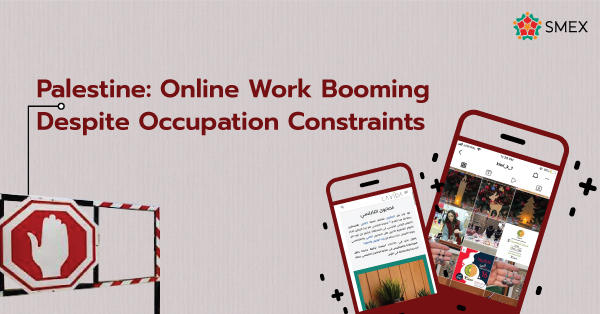A few days ago, Rula Abdeen, 22, from Gaza City, was busy carefully packaging handmade wooden accessories and crafts in cardboard boxes, in preparation for a handicraft exhibition in the city.
Like many young people in Gaza and Palestine, finding a job after graduation was not easy for her. Unemployment rates in the Gaza Strip (47%) and the West Bank (16%) skyrocketed as a result of the economic situation in Palestine, the Israeli blockade on Gaza and the closure of the Gaza Strip’s crossing points.
Through social media platforms, Rula found a work opportunity to launch her business, “Kiwi,” selling handicrafts, accessories and wooden pieces celebrating Islamic and Christian holidays. However, supply and transport are a challenge for Rula and other business ventures in the strip.
“We suffer from a shortage of raw materials and a difficulty in delivering goods and transferring money due to the blockade and the occasional closure of crossing points, all of which hinder the growth of any business,” she tells SMEX.
Digital opportunities
More than 130 kilometers from the Gaza Strip, Medhat Al-Atoot, 28, from Nablus City, north of the West Bank, posts new pictures of handmade Nabulsi soap bars, highlighting their bright colors and fragrant scent, and responds to customer requests and messages through his website.
After years of relentlessly searching for a steady job, Al-Atoot, a business school grad, decided to turn to alternatives provided by the tremendous development in technology. “Six months ago, I decided to turn to social media platforms to develop my father’s small business in the famous Nabulsi soap industry, by marketing the soap through Instagram and Facebook and by creating a website for the atelier,” he explained.
Al-Atoot’s “La Vida” project, meaning life in Spanish, is facing several challenges, including the difficulty of convincing people of the products’ good quality, selling online and gaining their trust, in addition to low incomes.”
However, even though the financial return is very minimal, Ghada Abu Samra, 22, a university student from Gaza City is adamant about staying on the course and facing reality head-on despite the difficult living conditions.
As she was adding her special touch to the colorful candles for her Instagram and Facebook shops “Ocean and Wave,”, she explained to SMEX that “online businesses and e-marketing require patience. They are available to everyone despite the fierce competition and increasing difficulties in the last few years.”
Israeli occupation suppresses digital connectedness
“3.7 million citizens use the internet in Palestine, up by 100,000 users in 2021 only,” as confirmed Palestinian Prime Minister Muhammad Shtayyeh at the Digital Palestine Even in March 2022.
The wide internet access in Palestine “has encouraged many to learn remote work and e-marketing techniques. Many young professionals in Gaza working in design, translation and programming, are now providing their services to international markets as well as to their fellow citizens in the West Bank,” said journalist and e-marketing coach Sidqi Abu Dhair from Nablus city, in an interview with SMEX.
Nonetheless, it is not without great challenge and difficulty, such as “the absence and ban on money transfer platforms, high costs of shipping, transportation, taxes and customs fees on imported goods, not to mention the difficulty of transporting them between Palestinian cities, especially between the West Bank and the Gaza Strip.”
A highly-placed source in a Palestinian governmental body in charge of the entry and exit of goods to and from the Gaza Strip, who preferred to remain anonymous, told SMEX that “the goods pass through the Karam Abu Salem crossing, the only commercial crossing in the Strip.”
However, the occupation authorities “only allow the entry and exit of limited types of goods such as clothes and paper parcels from the Gaza Strip to the West Bank and Jerusalem and vice versa, exceptionally, through the Beit Hanoun (Erez) checkpoint designated for individuals and separating the Gaza Strip from historical Palestinian territories.”
Therefore, most e-shop owners either adopt the cash-on-delivery system, through delivery companies or taxis, or they operate through bank transfers, which are often not the customers’ first choice due to the imposed bank fees.
All of these challenges pale in comparison to the occupation’s control of the Palestinian IT infrastructure, the restricted access to basic equipment under security pretexts, the violation of digital rights through censorship, invasion of privacy and all forms of tracking, espionage, silencing Palestinian content and attempts to shrink Palestinians’ space for expression.
Linda Safarini from Ramallah, expert in digitization and digital rights, confirms that “the Israeli occupation controls the Palestinian telecommunications infrastructure; while the world uses the 5th generation of mobile network (5G) (and moving to the 6G in 2023), the Israeli occupation authorities only permit Palestine to use 3G in the West Bank, and 2G in the Gaza Strip as the latest technology so far.”
Safarini adds that “Israeli hegemony over all sectors of life has swallowed the digital space in Palestine as well, as it controls everything related to digitization, including platforms, websites, applications, other online activities.”
PayPal’s apartheid
Online business owners and users in Palestine face “significant restrictions imposed by the Israeli occupation and even the Palestinian Authority and external parties, on money transfers under security pretexts and allegations,” according to Abu Dhair. Furthermore, some financial technology platforms refrain from providing their services to Palestinians even though they make them available to settlers, such as PayPal.
This American company “contributes to the occupation’s policies that are discriminatory in nature, which further exacerbate its devastating effects on Palestinians and their economy,” according to 7amleh Organization for Digital Rights in Palestine. For instance, PayPal’s “discriminatory exclusion of Palestinians has reduced the business of many Palestinian online freelance workers, entrepreneurs, and companies.”
In many cases, turning to other alternatives becomes useless to Palestinians, according to this “7amleh” report, because “other payment companies are often affiliated with PayPal and therefore have the same discriminatory policy in Palestine, or they are competing companies but are not interested in working in Palestine.”
Many people turn to other cash service providers such as Western Union or MoneyGram, which are available in Palestine, as is the case of Palestinian engineer Fadwa Kassab, 26, an online freelancer from the Gaza Strip.
However, there are “restrictions on the amounts transferred to the Strip exceeding two thousand dollars,” as Kassab confirms to SMEX, noting that she prefers to receive less than this amount. “If I receive more than one small transfer, my account might be frozen, or I might lose a lot because of fees that sometimes exceed the amounts.”
In the context of digital transformation and the provision of partial solutions by Palestinian banks and companies, the Bank of Palestine launched the PalPay digital payment service, while the Palestinian mobile communications company Jawwal launched the digital Jawwal Pay service.
These services “have enabled users to easily buy and sell products and services on the internet in the West Bank and Gaza Strip,” according to 7amleh. However, “They are not an effective solution to the problems of money transfers, because they work only in Palestine and users or customers cannot exchange money between them or with business owners elsewhere.”
Despite all this, Abu Dhair believes that online freelancing and learning skills are an opportunity that one should seize no matter the circumstances.



